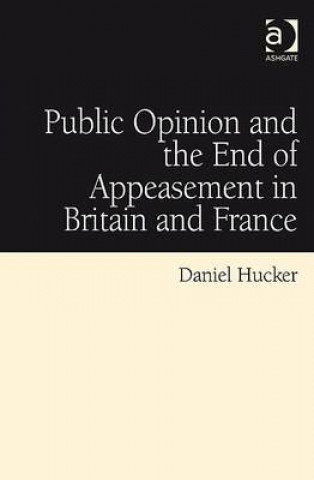
Kód: 04782198
Public Opinion and the End of Appeasement in Britain and France
Autor Daniel Hucker
The 1930s policy of appeasement is still fiercely debated by historians, critics and contemporary political commentators, more than 70 years after the signing of the 1938 Munich Agreement. What is less well-understood, however, is ... celý popis
- Jazyk:
 Angličtina
Angličtina - Vazba: Pevná
- Počet stran: 304
Nakladatelství: Taylor & Francis Ltd, 2011
- Více informací o knize

Mohlo by se vám také líbit
-

Philip de Laszlo
1987 Kč -

Bill Henson
4363 Kč -

Living Health; Phiri's Goal
193 Kč -

AG 2001 Election Supplement Magazine
981 Kč -

Twentieth-Century South Africa
578 Kč -

New House
568 Kč -

Cognitive Radio and Dynamic Spectrum Access
3010 Kč
Dárkový poukaz: Radost zaručena
- Darujte poukaz v libovolné hodnotě a my se postaráme o zbytek.
- Poukaz se vztahuje na celou naši nabídku.
- Elektronický poukaz vytisknete z e-mailu a můžete ihned darovat.
- Platnost poukazu je 12 měsíců od data vystavení.
Více informací o knize Public Opinion and the End of Appeasement in Britain and France
Nákupem získáte 531 bodů
 Anotace knihy
Anotace knihy
The 1930s policy of appeasement is still fiercely debated by historians, critics and contemporary political commentators, more than 70 years after the signing of the 1938 Munich Agreement. What is less well-understood, however, is the role of public opinion on the formation of British and French policy in the period between Munich and the outbreak of the Second World War; not necessarily what public opinion was but how it was perceived to be by those in power and how this contributed to the policymaking process. It therefore fills a considerable gap in an otherwise vast literature, seeking to ascertain the extent to which public opinion can be said to have influenced the direction of foreign policy in a crucial juncture of British and French diplomatic history. Employing an innovative and unique methodological framework, the author distinguishes between two categories of representation: firstly, 'reactive' representations of opinion, the immediate and spontaneous reactions of the public to circumstances/events as they occur; and secondly, 'residual' representations, which can be defined as the remnants of previous memories and experiences, the more general tendencies of opinion considered characteristic of previous years, even previous decades. It is argued that the French government of Edouard Daladier was consistently more attuned to the evolution of 'reactive' representations than the British government of Neville Chamberlain and, consequently, it was the French rather than the British who first pursued a firmer policy towards the European dictatorships. This comparative approach reveals a hitherto hidden facet of the diplomatic prelude to the Second World War; that British policy towards France and French policy towards Britain were influenced by their respective perceptions of public opinion in the other country. A sophisticated analysis of a crucial period in international history, this book will be essential reading for scholars of the origins of World War II, the political scenes of late 1930s Britain and France, and the study of public opinion and it affects on policy.
 Parametry knihy
Parametry knihy
Zařazení knihy Knihy v angličtině Humanities History Regional & national history
5308 Kč
- Plný název: Public Opinion and the End of Appeasement in Britain and France
- Autor: Daniel Hucker
- Jazyk:
 Angličtina
Angličtina - Vazba: Pevná
- Počet stran: 304
- EAN: 9781409406259
- ISBN: 1409406253
- ID: 04782198
- Nakladatelství: Taylor & Francis Ltd
- Hmotnost: 614 g
- Rozměry: 242 × 163 × 24 mm
- Datum vydání: 28. January 2011
Oblíbené z jiného soudku
-

Strange Death of Europe
396 Kč -

The Fourth Turning
445 Kč -

Beyond Band of Brothers
382 Kč -

Secret History
283 Kč -

Diana: Her True Story - In Her Own Words
298 Kč -

History of the Ancient Near East ca. 3000 - 323 BC 3e
1258 Kč -

Where I Was From
258 Kč -

City of Fortune
333 Kč -

Short History of England
298 Kč -

The Great Depression: A Diary
428 Kč -

Gulag
382 Kč -

Hangman's Diary
305 Kč -

Hezbollah
742 Kč -

To Hell and Back
435 Kč -

Sicily
382 Kč -

Olympic, Titanic, Britannic
726 Kč -

On China
342 Kč -

Native American History
521 Kč -

With the Old Breed
392 Kč -

Life and Death of Anne Boleyn
553 Kč -

Venetians in Constantinople
914 Kč -

Penguin History Of Latin America
425 Kč -

Few
232 Kč -

Civil War
283 Kč -

Century of Palestinian Rejectionism and Jew Hatred
235 Kč -

Later Roman Empire
239 Kč -

Kojiki
749 Kč -

Kaiser Wilhelm II
640 Kč -

Seven Pillars of Wisdom
288 Kč -

Norman Kingdom of Sicily
1786 Kč -

Australia: A Very Short Introduction
232 Kč -

Regime Politics
948 Kč -

Russia and the Russians
482 Kč -

How to Write an IB History Essay
541 Kč -

History of Greek Religion
563 Kč -

Mycenaean World
856 Kč -

Russia Under the Old Regime
333 Kč -

French Army 1870-71 Franco-Prussian War (2)
418 Kč -

Sicily
727 Kč -

Civilization of Europe in the Renaissance
436 Kč -

Iran-Iraq War
1293 Kč -

Berlin
337 Kč -

Hidden War
347 Kč -

German Order of Battle
567 Kč -

Amazons
322 Kč -

Dictionary of Ancient Egypt
742 Kč -

Marie Antoinette
333 Kč -

Genghis Khan
411 Kč -

Ten Myths About Israel
338 Kč
Osobní odběr Praha, Brno a 12903 dalších
Copyright ©2008-24 nejlevnejsi-knihy.cz Všechna práva vyhrazenaSoukromíCookies



 Vrácení do měsíce
Vrácení do měsíce 571 999 099 (8-15.30h)
571 999 099 (8-15.30h)